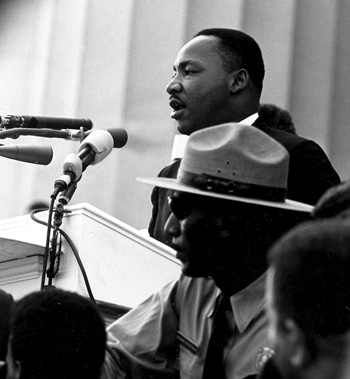
Dr. Martin Luther King Jr. is remembered as a leader in the fight for civil rights – but when he was killed in Memphis, Tenn., on April 4, 1968, King was actually in the city to support a union strike.
King was in Memphis to support African American garbage workers, who, carrying signs blazoned with “I Am A Man,” were on strike to protest unsafe conditions, abusive white supervisors, and low wages.
His support of labor may have been largely overshadowed by his civil rights activism, but it was no less significant. In 1961, King attended the AFL-CIO’s annual convention, helping to bridge civil rights for African Americans with the labor movement.
“The labor movement did not diminish the strength of the nation but enlarged it. By raising the living standards of millions, labor miraculously created a market for industry and lifted the whole nation to undreamed of levels of production. Those who today attack labor forget these simple truths, but history remembers them,” he said at the convention.
And the support went both ways. When King was jailed in Birmingham for participating in civil disobedience, Walter Reuther, the leader of the United Auto Workers (UAW) union, bailed him out and several major unions donated money to civil rights groups, supported sit-ins and freedom rides, and helped organize the 1963 March on Washington, famous for King’s “I Have a Dream” speech.
Addressing the Illinois AFL-CIO in 1965, King said: “The two most dynamic movements that reshaped the nation during the past three decades are the labor and civil rights movements. Our combined strength is potentially enormous.”
Looking back on his life and legacy on January 17, 2022, PEF President Wayne Spence spoke to local news media about King’s connection to the labor movement.
“Dr. Martin Luther King’s core values – equality and justice for all – are still what govern the labor movement to this day,” Spence said. “We are always fighting for equal treatment in accordance with our collective bargaining agreements. We fight every day for justice on behalf of the workers we represent, who have rights and protections in their contract that are all too often ignored by management.”
Spence said King knew there was strength in numbers.
“The greater our collective voice, the more people in power will hear us and the greater impact we can have.”
